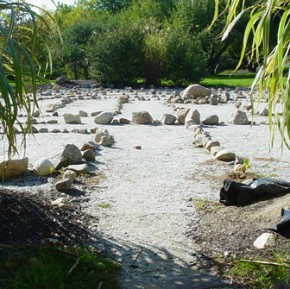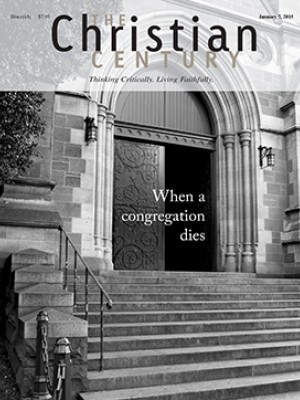Sharing the peace

A group of peacemakers gathered at Stony Point Center, about an hour north of New York City, where modest living quarters nestle in a circle, capped by a cafeteria and meeting space. A chapel, a labyrinth, and vegetable gardens grace the outlying areas.
I always breathe a little deeper at Stony Point. The conference center’s welcome includes what’s on my dinner plate. The chef uses the freshest local ingredients to create amazing dishes and breads. I know that the food did not travel thousands of miles to reach my plate. It did not waste petroleum nor did it have to be genetically altered to endure the journey.
Read our latest issue or browse back issues.
I’m drawn to Stony Point by the ideas and work shared there, and by the culture of the place. On a theological level, this pastoral nook has gathered interfaith peacemaking thinkers and activists—people working on issues of civil rights, gun violence, and the sanctuary movement. The land vibrates with the legacies of men and women who risked much for their ideals. As someone who wasn’t alive in the 1960s, I’m often in awe of what happened during the civil rights movement and am relieved when current peacemaking efforts move beyond acts of nostalgia.
Each time I visit Stony Point I end up in a conversation with a rabbi, professor, or international student and walk away amazed at the convergence of our intentions.
Stony Point Center is directed by Rick Ufford-Chase, along with his wife, Kitty Ufford-Chase. He is also the executive director of the Presbyterian Peace Fellowship, a network engaged in God’s nonviolent work of love, peace, and justice whose board meets at Stony Point. The PPF supported conscientious objectors during World War II, and it continues to support voices committed to peace.
Under Ufford-Chase’s leadership, the PPF board realized it had a couple of choices. It could invest in full-time staff and in regional coordinators to make sure that the institutional structure of PPF remained strong, or it could invest in the innovative work that peacemaking communities were doing on the ground. The choice was between building an institution and building a movement. The board decided to put its resources into the movement.
“We were looking for newer, diverse groups with a commitment to nonviolence and Jesus,” said Fritz Gutwein, associate director of PPF. “We wanted people who were doing vibrant work in particular neighborhoods. We wanted intentional communities, oriented around peace.” PPF partnered with seven communities, giving them grants and gathering the leaders for an annual meeting. (Full disclosure: my husband is a member of one such community.)
The seven communities focus on different aspects of peacemaking. For example, Albany Catholic Worker in upstate New York engages in urban gardening in vacant lots. It formed the New Sanctuary for Immigrants, which serves vulnerable immigrants and those who lack legal documentation. Hands and Feet of Asheville, North Carolina, a yearlong service program for young adults, aims to break down power structures and build up the reign of God in down-to-earth ways—through direct service, intentional community, and theological reflection. Alianza2638 in Chicago holds a ministry of prayer in a lavandería, or laundromat, and is an ally of the global work of Christian Peacemaker Teams.
Through these organizations, PPF is supporting immigrants, calling for minimum wage increases, building community gardens, and accompanying vulnerable citizens in Colombia. PPF and the communities it supports long to transform the church and, through the church, the world. Some of this happens at the annual meeting.
“When communities come together,” Gutwein said, “they look into each other’s lives, share their stories, and share their passions. Excitement happens when you realize you’re not alone. You realize that other people have been doing this for a long time. You gain encouragement and insights of what possibilities are there.” As they meet together, participants build a network that takes part in theological, practical, and cultural work, which marks an important transition for the organization.
“The Peace Fellowship has been a bunch of individuals who have been connected,” Gutwein explained. Now the group is asking, “How can we be a group of communities that are gathered and connected? How can we transform the world through the church?”







